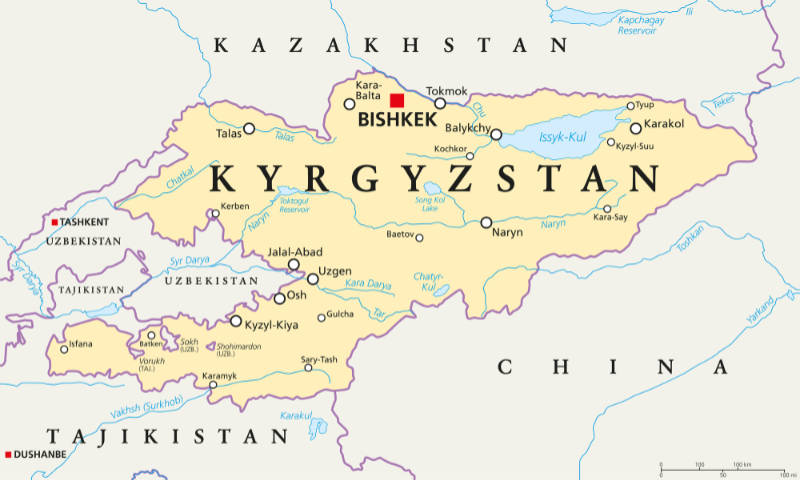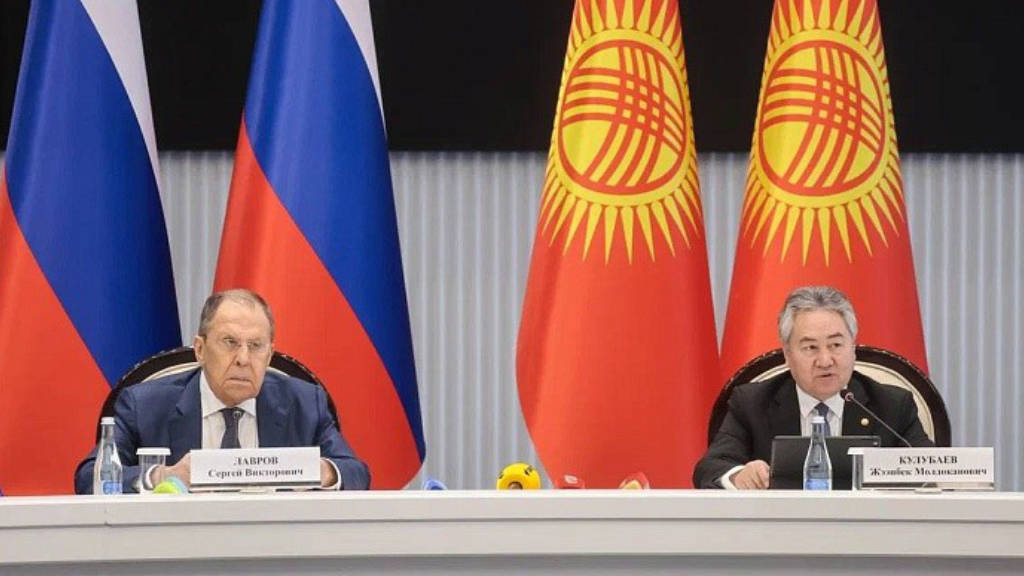The Russian Foreign Minister, Sergey Lavrov, has been on an official visit to Kyrgyzstan to meet with the Kyrgyz President Sadyr Japarov and Foreign Minister Jeenbek Kulubayev. He arrived at Cholpon-Ata, a resort town on the northern shore of Lake Issyk-Kul, where bilateral meetings were held, and the Council of Foreign Ministers of the Collective Security Treaty Organization are convening.
The meetings with Kyrgyz officials focused on cooperation in political, trade, economic, military-technical, cultural, humanitarian and other areas in the context of expansion of multifaceted Russian-Kyrgyz ties. They also discussed the most pressing issues on the regional and global agenda and ways to develop Eurasian integration.
Lavrov subsequently made a statement concerning Russian-Kyrgyz relations and developments as follows: “I have met with Foreign Minister of Kyrgyzstan Jeenbek Kulubaev, for substantive narrow-format discussions followed by a meeting with the participation of the delegation members. We had an in-depth discussion of the entire range of Russian-Kyrgyz interaction in the context of the goals set by the presidents and outlined plans for expanding it.
We reviewed trade, economic, and investment cooperation, in which Russia is among Kyrgyzstan’s leading partners. As of late 2024, growth exceeded 22% and trade in 2024 grew significantly to US$4 billion. Our respective Presidents have set the goal of taking this figure to US$5 billion.
We noted in particular that the share of national currencies in payments for mutual export and import transactions has reached 98% of all bilateral trade. Russian direct investment in Kyrgyzstan is growing, with Russia being one of the leading investors in the economy of Kyrgyzstan.
We talked about the important coordinating role of the Intergovernmental Russian-Kyrgyz Commission on Trade, Economic, Scientific, Technical, and Humanitarian Cooperation. Its 26th session will be held in Kyrgyzstan this year.
We discussed enhancing cooperation in the humanitarian sphere, primarily education. Both sides emphasised the importance of launching a major joint project initiated by the presidents to build nine comprehensive schools in Kyrgyzstan with instruction provided in Russian. The project will be funded from the Russian budget. We reiterated mutual commitment to the earliest possible modernisation of the Kyrgyz-Russian Slavic University named after first President of the Russian Federation Boris Yeltsin, including the construction of a new campus. The actual work will start soon.
We discussed labour migration as well. Many widely attended and substantive meetings on this matter have been held over the past couple of weeks, including the Deputy Foreign Minister of Kyrgyzstan’s visit to Russia to participate in substantive consultations with the participation of the Interior Ministry, the Foreign Ministry, the Ministry of Education, and the Ministry of Digital Development of Russia.
We attach great importance to making sure that foreign citizens residing in our country comply with the rules of stay and take timely actions to keep in line with the regulations governing their legal status based on the relevant EAEU provisions and Russia’s domestic regulations outlined in the Presidential Executive Order, which entered into force in January 2025.”
As Lavrov pointed out, Russia has recently amended its immigration laws and tightened various loopholes. This has created some initial confusion amongst the Kyrgyz labour force, which traditionally sends annual labour to Russia to assist with the harvest as well as being a source for longer term roles such as taxi drivers and cooks and so on. Russia is a key destination for Kyrgyz migrant workers, with remittances from workers abroad making up a significant portion of Kyrgyzstan’s GDP. About 1 million Kyrgyz nationals work in Russia.

Kyrgyzstan is actively engaged in several free trade agreements to enhance its economic integration. It is a member of the Eurasian Economic Union (EAEU), which allows for the elimination of tariffs and trade barriers among member states. In June 2024, Kyrgyzstan ratified a trade agreement with Iran to bolster trade relations. Additionally, Kyrgyzstan benefits from the Generalized Scheme of Preferences Plus (GSP+), providing tariff-free access to the EU market for over two-thirds of its products, which has been instrumental in boosting exports. The Enhanced Partnership and Cooperation Agreement (EPCA) signed with the EU in June 2024 aims to strengthen bilateral cooperation in trade, governance, and environmental protection. Russian online retail investors such as Wildberries and Ozon has also established operations in Kyrgyzstan to help facilitate China trade.
With a population of approximately 7.2 million, Kyrgyzstan’s GDP (PPP) stands at around US$48.1 billion, GDP per capita (PPP) at US$6,790, with a projected GDP growth for 2025 at 6.8%.
Regarding bilateral trade with Russia, in 2021 it stood at US$2.49 billion, US$3.4 billion in 2022, and US$3 billion in 2023. In 2024, the total trade turnover exceeded US$4 billion, reflecting a significant rise, as both countries aim for a mutual trade target of US$5 billion.
Further Reading

 Русский
Русский














